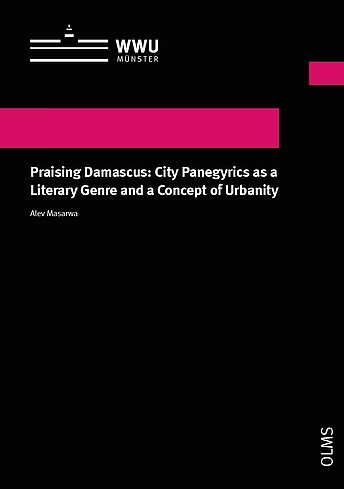Masarwa
Praising Damascus: City Panegyrics as a Literary Genre and a Concept of Urbanity
ISBN 978-3-487-16272-0
Taking panegyric literature about Damascus as an example, this study discusses its literary elaboration and established motif traditions in relation to a wide range of textual representations of cities. The vast corpus of city panegyrics in prose and poetry gives testimony to the dynamics of urban life and urban consciousness, as it has also always been a source of civic pride and belonging. The vigorous form of aesthetic elaboration about cities was both persistent and open for contestation at the same time. A striking example, which attests to this contestation and the dynamics of city praise is a city-slam (mufahara / munazara) between Baghdad and Damascus, written in ca. 16th century Syria. This study focuses on rhetorical elements and their inversion in the city praise rather than on the topographical history of Damascus or other featured cities. Exposing the aesthetic devices and analyzing their functions by inverting them according to the rules of poetic speech offers a convenient tool for a more adequate understanding of city panegyrics, and the cultural perception of cities. Panegyrics contain assertions relating both to praise and criticism. Hardly any literary city praise is a mere embellishment or a hymnody of the respective city, and hardly any form of dispraise is just a verbal outburst without offering a counterproposal.
Am Beispiel der panegyrischen Literatur über Damaskus werden in dieser Studie die literarische Ausarbeitung und die etablierten Motivtraditionen in Bezug auf ein breites Spektrum an textlichen Darstellungen von Städten diskutiert. Das umfangreiche Korpus der Stadtpanegyrik in Prosa und Poesie zeugt von der Dynamik des städtischen Lebens und des städtischen Bewusstseins, da es immer auch eine Quelle des Bürgerstolzes und der Zugehörigkeit war. Die lebendige Form der ästhetischen Ausarbeitung über die Städte war gleichzeitig beständig und anfechtbar. Ein bemerkenswertes Beispiel, das diese Anfechtung und die Dynamik des Lobes der Städte belegt, ist ein Städte-Slam (mufahara / munazara) zwischen Bagdad und Damaskus, geschrieben im Syrien des 16. Jahrhunderts. Diese Studie konzentriert sich auf die rhetorischen Elemente und ihre Umkehrung im Stadtlob und nicht auf die topografische Geschichte von Damaskus oder anderen vorgestellten Städten. Die Offenlegung der ästhetischen Mittel und die Analyse ihrer Funktionen durch ihre Umkehrung nach den Regeln der poetischen Sprache bietet ein geeignetes Instrument für ein angemesseneres Verständnis der Stadtpanegyrik und der kulturellen Wahrnehmung von Städten. Panegyrik enthält sowohl lobende als auch kritische Äußerungen. Kaum ein literarisches Stadtlob ist eine bloße Verschönerung oder eine Hymne auf die jeweilige Stadt, und kaum eine Form der Verunglimpfung ist nur ein verbaler Ausbruch ohne Gegenvorschlag.


